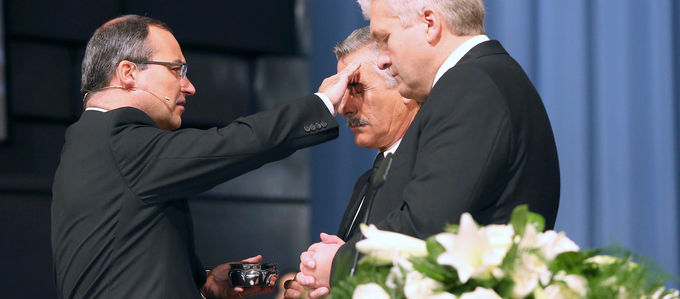
Three years and 66 parts later… The series on the sacraments has given us a lot of food for thought on theology and history in general and on New Apostolic specialties in particular. As a final instalment, here is an overview with dozens of links.
Sacraments are those moments in our life of faith when heaven and earth practically touch and when God sets signs of His love. They follow a blueprint with four cornerstones. The origins of the term “sacrament” lie in the biblical word mysterion.
The basis of the Christian sacramental doctrine was laid by the Church Father Augustine in the fifth century. The question of the efficacy preoccupied scholars in the late Middle Ages and in the early Reformation. Depending on the denomination, the number of sacraments varies between two and seven. More similarities are shared when it comes to who is entitled to administer which sacrament.
Washed with all kinds of water
Baptism comes from diving—at least in the Greek—with the connotation of submersion or immersion. The Bible has a lot to say about what the sacrament means. The understanding of it shifted again and again with the circumstances over the course of history.
The Bible has little to say on the rite of baptism, which is why different forms developed. There are also different views on infant baptism. Even the place of the event changed over the centuries.
It took centuries before most denominations acknowledged each other’s baptisms. Also the New Apostolic Church is part of this baptismal community.
At the table with Jesus
Holy Communion is the sacrament that is celebrated repeatedly. It was instituted by Jesus Christ at the Last Supper. But the Bible says little about when and how exactly this took place. All the more varied are the designations and interpretations for it in the New Testament.
Away from the family dinner, towards a church service: this is the development in antiquity. It only began to get theological in the Middle Ages, when the real presence of Jesus Christ had to be explained anew. The Reformation provided additional explanatory models. In the history of the New Apostolic Church, Holy Communion took its own development in terms of significance and in the consecration formula.
When it comes to liturgy, the Churches strike out on their own. This includes how, where, and when the congregation gathers to partake of bread and wine. Who may dispense or receive the sacrament is also regulated differently. Attempts to celebrate together have been made time and again. But the leap over the church fence is still difficult. Nevertheless, there is substantial common ground beyond the sacrament.
With the power of the Spirit
How does a Christian receive the Holy Spirit? Through Holy Sealing. This is the answer of the New Apostolic Church. There is a diversity of perspectives from the Christian spectrum, which has its roots in the complex testimony of the New Testament.
This is how the early church developed its multi-part baptismal rite. The Catholics uncoupled their rite of confirmation and made an independent sacrament of Confirmation. The Reformers had issues with this. Following a crisis, the Catholic Apostolic Church introduced the laying on of hands of an Apostle, alternatively also called “sealing”. The theological justification for this only unfolded in the course of time.
This developed in the nascent New Apostolic Church to become an identity-forming principal sacrament. The carefully derived current understanding is set out in the Catechism.
There as well as here
Sacraments for the departed are a trademark of the New Apostolic Church. This notion based on the immortality of the soul and the possibility of change in the hereafter. Other denominations have also come to believe that sacraments can help the dead.
There are three pillars that support the New Apostolic Church’s understanding of salvation for the departed: the will of God to make salvation accessible to all human beings, the motif of Christ’s descent into the realms of the dead, and the vicarious baptism practised by the Corinthians, which was later abandoned. The teaching follows two basic laws of Christian faith: God creates salvation in this world and relies on the principle of substitution.
In the early days of the sacraments for the departed, things were quite turbulent sometimes. But step by step, the New Apostolic Church regulated the practical part and clarified the theory. This has nothing to do with spiritualism, quite the opposite. Three times a year, the congregations across the world celebrate the divine service for the departed.
Foto: christianchan – stock.adobe.com













